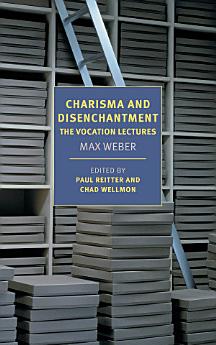Charisma and Disenchantment: The Vocation Lectures
Max Weber
फ़र॰ 2020 · New York Review of Books
ई-बुक
176
पेज
family_home
योग्य
info
reportरेटिंग और समीक्षाओं की पुष्टि नहीं हुई है ज़्यादा जानें
इस ई-बुक के बारे में जानकारी
A new translation of two celebrated lectures on politics, academia, and the disenchantment of the world.
The German sociologist Max Weber is one of the most venturesome, stimulating, and influential theorists of the modern condition. Among his most significant works are the so-called vocation lectures, published shortly after the end of World War I and delivered at the invitation of a group of student activists. The question the students asked Weber to address was simple and haunting: In a modern world characterized by the division of labor, economic expansion, and unrelenting change, was it still possible to consider an academic or political career as a genuine calling? In response Weber offered his famous diagnosis of “the disenchantment of the world,” along with a challenging account of the place of morality in the classroom and in research. In his second lecture he introduced the notion of political charisma, assigning it a central role in the modern state, even as he recognized that politics is more than anything “a slow and difficult drilling of holes into hard boards.”
Damion Searls’s new translation brings out the power and nuance of these celebrated lectures. Paul Reitter and Chad Wellmon’s introduction describes their historical and biographical background, reception, and influence. Weber’s effort to rethink the idea of a public calling at the start of the tumultuous twentieth century is revealed to be as timely and stirring as ever.
The German sociologist Max Weber is one of the most venturesome, stimulating, and influential theorists of the modern condition. Among his most significant works are the so-called vocation lectures, published shortly after the end of World War I and delivered at the invitation of a group of student activists. The question the students asked Weber to address was simple and haunting: In a modern world characterized by the division of labor, economic expansion, and unrelenting change, was it still possible to consider an academic or political career as a genuine calling? In response Weber offered his famous diagnosis of “the disenchantment of the world,” along with a challenging account of the place of morality in the classroom and in research. In his second lecture he introduced the notion of political charisma, assigning it a central role in the modern state, even as he recognized that politics is more than anything “a slow and difficult drilling of holes into hard boards.”
Damion Searls’s new translation brings out the power and nuance of these celebrated lectures. Paul Reitter and Chad Wellmon’s introduction describes their historical and biographical background, reception, and influence. Weber’s effort to rethink the idea of a public calling at the start of the tumultuous twentieth century is revealed to be as timely and stirring as ever.
लेखक के बारे में
Max Weber (1864–1920) was a sociologist, philosopher, jurist, and political economist. Considered one of the founders of modern sociology, he is best known for his book The Protestant Ethic and the Spirit of Capitalism.
Damion Searls is a translator from German, French, Norwegian, and Dutch and a writer in English. His own books include What We Were Doing and Where We Were Going, The Inkblots, and The Philosophy of Translation. He received the Helen and Kurt Wolff Translator's Prize in 2019 for Uwe Johnson's Anniversaries.
Paul Reitter teaches in the German department at the Ohio State University. He is the co-editor, along with Chad Wellmon, of Anti-Education: On the Future of Our Educational Institutions by Friedrich Nietzsche, which was published by NYRB Classics in 2015.
Chad Wellmon is the author of Becoming Human: Romantic Anthropology and the Embodiment of Freedom, Organizing Enlightenment: Information Overload and the Invention of the Modern Research University, and the forthcoming Permanent Crisis: The Humanities in a Disenchanted Age. He is on the faculty of the University of Virginia.
Damion Searls is a translator from German, French, Norwegian, and Dutch and a writer in English. His own books include What We Were Doing and Where We Were Going, The Inkblots, and The Philosophy of Translation. He received the Helen and Kurt Wolff Translator's Prize in 2019 for Uwe Johnson's Anniversaries.
Paul Reitter teaches in the German department at the Ohio State University. He is the co-editor, along with Chad Wellmon, of Anti-Education: On the Future of Our Educational Institutions by Friedrich Nietzsche, which was published by NYRB Classics in 2015.
Chad Wellmon is the author of Becoming Human: Romantic Anthropology and the Embodiment of Freedom, Organizing Enlightenment: Information Overload and the Invention of the Modern Research University, and the forthcoming Permanent Crisis: The Humanities in a Disenchanted Age. He is on the faculty of the University of Virginia.
इस ई-बुक को रेटिंग दें
हमें अपनी राय बताएं.
पठन जानकारी
स्मार्टफ़ोन और टैबलेट
Android और iPad/iPhone के लिए Google Play किताबें ऐप्लिकेशन इंस्टॉल करें. यह आपके खाते के साथ अपने आप सिंक हो जाता है और आपको कहीं भी ऑनलाइन या ऑफ़लाइन पढ़ने की सुविधा देता है.
लैपटॉप और कंप्यूटर
आप अपने कंप्यूटर के वेब ब्राउज़र का उपयोग करके Google Play पर खरीदी गई ऑडियो किताबें सुन सकते हैं.
eReaders और अन्य डिवाइस
Kobo ई-रीडर जैसी ई-इंक डिवाइसों पर कुछ पढ़ने के लिए, आपको फ़ाइल डाउनलोड करके उसे अपने डिवाइस पर ट्रांसफ़र करना होगा. ई-रीडर पर काम करने वाली फ़ाइलों को ई-रीडर पर ट्रांसफ़र करने के लिए, सहायता केंद्र के निर्देशों का पालन करें.




